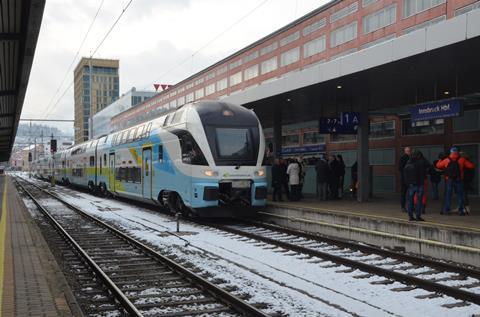
EUROPE: Open-access operator Westbahn commenced Wien – Innsbruck services with effect from the December 11 timetable change, with its first service leaving Wien Westbahnhof at 07.08.
The route forms an extension of the open access operator’s existing Wien – Salzburg service. There are three trains each way per day, departing from Wien at 07.08, 11.08 and 17.08, and from Innsbruck at 06.31, 12.31 and 16.31. The end to end journey time is 4 h 21 min for the 506 km trip, 1 min faster than national operator ÖBB’s Railjet Xpress service to and from Wien Hauptbahnhof. Trains run through Germany between Freilassing and Kufstein, bypassing Rosenheim.
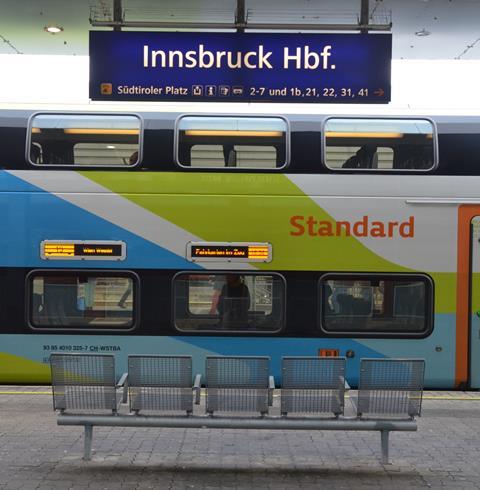
Westbahn offers three classes of accommodation: Standard, Comfort, which is essentially a standard premium offering with more legroom, and First Class, which features 2+1 seating, complementary reservations and an at-seat catering option.
Speaking to Railway Gazette during the launch ceremony in Innsbruck, Westbahn Chief Executive Thomas Posch dismissed suggestions that the lower top speed of Westbahn’s 200 km/h EMUs would be an issue; ÖBB’s Railjets can run at up to 230 km/h.
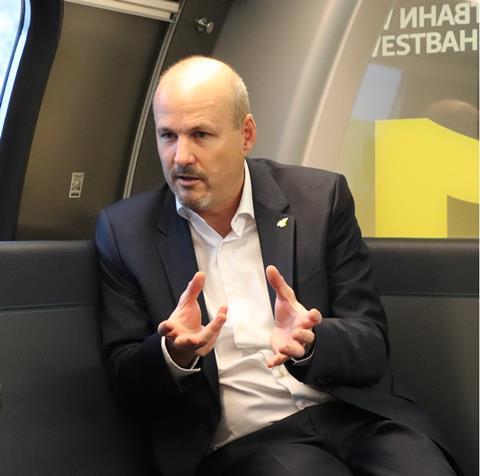
‘Our Stadler trainsets have much better acceleration than ÖBB’s Railjets, so the company’s timetable and journey times are adjusted to short stops and good acceleration rather than running at speeds over 200 km/h. We even try to run at 180 km/h if operations are stable and services are on time, to save energy’, Posch explained.
‘Quality has its own price’
The operator offers a lowest price of €18·99 for a one-way ticket from Wien to Innsbruck, ‘but the majority of the tickets are more expensive. We are not very aggressive on pricing competition, but we consider quality has its own price, and we see our customers like quality. So we want to convince customers with quality and reliability, rather than with low prices.’
The launch of a route to Innsbruck follows on from the München – Salzburg – Wien service that the company started in April. ‘The München service is a great success in terms of revenues, we had a break-even after only six months, and that is why our revenues are even higher now than before the pandemic. We reached pre-Covid passenger numbers by mid-2022’, Posch explained.
Aiming for Budapest
Talking about possible future growth, Posch explained that Westbahn is limited in terms of rolling stock for the 2022-23 timetable by its current fleet of 15 Stadler Kiss EMUs. In the short term therefore, he does not see any further route extensions as economically viable, and ‘we don’t want to reduce existing services’.
Westbahn currently operates 15 third-generation six-car Kiss double-deck EMUs, ordered in October 2019; these are leased to Westbahn by Austrian Train Finance, a wholly owned subsidiary of PCS Holding, the investment vehicle led by Stadler Chairman Peter Spuhler.
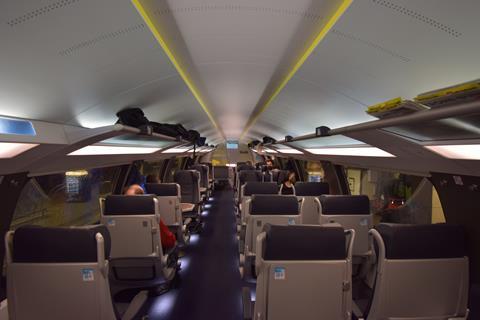
However, Westbahn is also leasing four double-deck trainsets from CRRC Zhuzhou under an agreement signed in December 2019, the terms of which Posch insisted ‘posed no risk to Westbahn’. The first of these arrived at the Velim test track in the Czech Republic in May, and he said testing and certification is still scheduled to be completed by mid-2023.
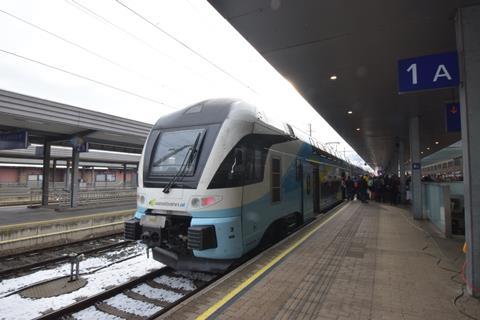
The addition of these four trainsets could then unlock further expansion, Posch believed. ‘When we’ll receive the four CRRC trainsets, Budapest would be a strategic option’, he suggested. ‘Of course, we are monitoring the Innsbruck extension’s performance, if this service brings a lot of passengers, we will increase the number of trains, but for now we are happy with three pairs of services per day.’
In the longer term, he said the operator would consider running from the Austrian capital to Graz and Klagenfurt, but only after completion of the Semmering Base Tunnel and the Koralmbahn reconstruction. Further expansion in Germany was not on the agenda, he believed, as ‘beyond München there is already strong competition’.

















